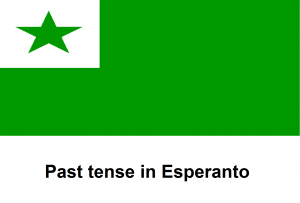Difference between revisions of "Language/Esperanto/Grammar/Past-Tense"
Jump to navigation
Jump to search
m (Quick edit) |
m (Quick edit) |
||
| Line 1: | Line 1: | ||
[[File:Past tense in Esperanto.png|alt=Past tense in Esperanto|thumb|Past tense in Esperanto]] | [[File:Past tense in Esperanto.png|alt=Past tense in Esperanto|thumb|Past tense in Esperanto]] | ||
Hello everybody, | Hello everybody, | ||
| Line 9: | Line 8: | ||
Feel free to edit this page by adding new words and expressions ! | Feel free to edit this page by adding new words and expressions ! | ||
Happy learning ! :) | |||
Upon getting the hang of this topic, you may find these relevant lessons worthwhile: [[Language/Esperanto/Grammar/Gender|Gender]], [[Language/Esperanto/Grammar/Negation|Negation]], [[Language/Esperanto/Grammar/Word-Order|Word Order]] & [[Language/Esperanto/Grammar/SUFFIXES|SUFFIXES]]. | |||
== '''Some explanation for Past tense in Esperanto''' == | == '''Some explanation for Past tense in Esperanto''' == | ||
'''<big><u>OBS.: In the infinitive form; change the last letter (-i) by (-is) to form the Past Tense</u></big>''' | '''<big><u>OBS.: In the infinitive form; change the last letter (-i) by (-is) to form the Past Tense</u></big>''' | ||
| Line 113: | Line 111: | ||
*'''I ate an egg - Mi manĝis ovon.''' | *'''I ate an egg - Mi manĝis ovon.''' | ||
== | ==Other Lessons== | ||
* [[Language/Esperanto/Grammar/COMPARATIVES|COMPARATIVES]] | * [[Language/Esperanto/Grammar/COMPARATIVES|COMPARATIVES]] | ||
* [[Language/Esperanto/Grammar/THE-PARTICIPLES|THE PARTICIPLES]] | * [[Language/Esperanto/Grammar/THE-PARTICIPLES|THE PARTICIPLES]] | ||
| Line 124: | Line 122: | ||
* [[Language/Esperanto/Grammar/CONJUNCTIONS|CONJUNCTIONS]] | * [[Language/Esperanto/Grammar/CONJUNCTIONS|CONJUNCTIONS]] | ||
* [[Language/Esperanto/Grammar/Comaratives-and-Superlatives|Comaratives and Superlatives]] | * [[Language/Esperanto/Grammar/Comaratives-and-Superlatives|Comaratives and Superlatives]] | ||
<span links></span> | |||
Latest revision as of 20:08, 26 March 2023
Hello everybody,
In today's lesson you will learn some useful vocabulary about ¨PAST TENSE¨ in Esperanto.
Feel free to edit this page by adding new words and expressions !
Happy learning ! :)
Upon getting the hang of this topic, you may find these relevant lessons worthwhile: Gender, Negation, Word Order & SUFFIXES.
Some explanation for Past tense in Esperanto[edit | edit source]
OBS.: In the infinitive form; change the last letter (-i) by (-is) to form the Past Tense
| ENGLISH | PRONUNCIATION
ENGLISH |
ESPERANTO | PRONUNCIATION
BRAZILIAN PORTUGUESE |
BRAZILIAN
PORTUGUESE |
|---|---|---|---|---|
| to have | hah vih | havi | ter | |
| I had | mih hah vihs | Mi havis | mi Ha vis | Eu tinha |
| You had | vih hah vihs | Vi havis | vi Ha vis | Você tinha |
| He had | lih hah vihs | Li havis | li Ha vis | Ele tinha |
| She had | shih hah vihs | Ŝi havis | chi Ha vis | Ela teve |
| We had | nih hah vihs | Ni havis | ni Ha vis | Nós tínhamos |
| You had | vih hah vihs | Vi havis | vi Ha vis | Vocês tinham |
| They had | ih lih hah vihs | Ili havis | ili Ha vis | Eles tinham |
| I came | mih veh nihs | Mi venis | mi ve nis | Eu vim |
| I ate an egg | mih mahn jihs oh vohn | Mi manĝis ovon | mi man djis o von | Eu comi um ovo |
In Esperanto, expressing past tense is changing the "-i" of a verb to "-is".[edit | edit source]
- I came. - Mi venis.
- I ate an egg - Mi manĝis ovon.
Other Lessons[edit | edit source]
- COMPARATIVES
- THE PARTICIPLES
- PREPOSITIONS
- Adjectives
- Interrogation
- Verbs
- ADVERBS
- WORD BUILDING
- CONJUNCTIONS
- Comaratives and Superlatives
